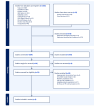Assessing the Uses, Benefits, and Limitations of Digital Technologies Used by Health Professionals in Supporting Obesity and Mental Health Communication: Scoping Review
- PMID: 39928923
- PMCID: PMC11851038
- DOI: 10.2196/58434
Assessing the Uses, Benefits, and Limitations of Digital Technologies Used by Health Professionals in Supporting Obesity and Mental Health Communication: Scoping Review
Abstract
Background: Obesity and mental health issues present interconnected public health challenges that impair physical, social, and mental well-being. Digital technologies offer potential for enhancing health care communication between health professionals (HPs) and individuals living with obesity and mental health issues, but their effectiveness is not fully understood.
Objective: This scoping review aims to identify and understand the different types of technologies used by HPs in supporting obesity and mental health communication.
Methods: A comprehensive scoping review, which followed a validated methodology, analyzed studies published between 2013 and 2023 across 8 databases. The data extraction focused on HPs' use of communication technologies, intervention types, biopsychosocial considerations, and perceptions of technology use. The review was guided by the following research question: "What are the uses, benefits, and limitations of digital technologies in supporting communication between HPs and persons living with obesity and mental health issues?"
Results: In total, 8 studies-featuring web-based platforms, social media, synchronous video calls, telephone calls, automated SMS text messaging, and email-met the inclusion criteria. Technologies such as virtual learning collaborative dashboards and videoconferencing, supported by automated SMS text messaging and social media (Facebook and WhatsApp groups), were commonly used. Psychologists, dietitians, social workers, and health coaches used digital tools to facilitate virtual appointments, diet and mental health monitoring, and motivational and educational support through group therapy, 1-on-1 sessions, and hybrid models. Benefits included enhanced access to care and engagement, personalized digital cognitive behavioral therapy, perceived stigma reduction, privacy, and improved physical health outcomes in weight reduction. However, improvements in mental health outcomes were not statistically significant in studies reporting P values (P≥.05). The limitations included engagement difficulties due to conflicting personal family and work commitments; variable communication mode preferences, with some preferring in-person sessions; and misinterpretations of SMS text messaging prompts. Conflicts arose from cultural and individual differences, weight stigma, and confusion over HP roles in obesity and mental health care.
Conclusions: Digital technologies have diversified the approaches HPs can take in delivering education, counseling, and motivation to individuals with obesity and mental health issues, facilitating private, stigma-reduced environments for personalized care. While the interventions were effective in obesity management, the review revealed a shortfall in addressing mental health needs. This highlights an urgent need for digital tools to serve as media for a deeper engagement with individuals' complex biopsychosocial needs. The integration of data science and technological advancements offers promising avenues for tailored digital solutions. The findings advocate the importance of continued innovation and adaptation in digital health care communication strategies, with clearer HP roles and an interdisciplinary, empathetic approach focused on individual needs.
Keywords: AI; PRISMA; artificial intelligence; complex needs; digital communication; digital technology; digital transformation; health professional; mental health; obesity.
©Amanda Kearns, Anne Moorhead, Maurice Mulvenna, Raymond Bond. Originally published in the Journal of Medical Internet Research (https://www.jmir.org), 10.02.2025.
Conflict of interest statement
Conflicts of Interest: None declared.
Figures




Similar articles
-
Comparing Email Versus Text Messaging as Delivery Platforms for Supporting Patients With Major Depressive Disorder: Noninferiority Randomized Controlled Trial.JMIR Form Res. 2024 Sep 9;8:e59003. doi: 10.2196/59003. JMIR Form Res. 2024. PMID: 39250182 Free PMC article. Clinical Trial.
-
The effectiveness of internet-based e-learning on clinician behavior and patient outcomes: a systematic review protocol.JBI Database System Rev Implement Rep. 2015 Jan;13(1):52-64. doi: 10.11124/jbisrir-2015-1919. JBI Database System Rev Implement Rep. 2015. PMID: 26447007
-
Evolutionary Trends in the Adoption, Adaptation, and Abandonment of Mobile Health Technologies: Viewpoint Based on 25 Years of Research.J Med Internet Res. 2024 Sep 27;26:e62790. doi: 10.2196/62790. J Med Internet Res. 2024. PMID: 39331463 Free PMC article.
-
Leveraging Personal Technologies in the Treatment of Schizophrenia Spectrum Disorders: Scoping Review.JMIR Ment Health. 2024 Sep 30;11:e57150. doi: 10.2196/57150. JMIR Ment Health. 2024. PMID: 39348196 Free PMC article.
-
Current experience and future potential of facilitating access to digital NHS primary care services in England: the Di-Facto mixed-methods study.Health Soc Care Deliv Res. 2024 Sep;12(32):1-197. doi: 10.3310/JKYT5803. Health Soc Care Deliv Res. 2024. PMID: 39324475 Review.
Cited by
-
Impact of clinical leadership on frontline nurses' quality of care: work engagement as mediator role.BMC Health Serv Res. 2025 Apr 16;25(1):560. doi: 10.1186/s12913-025-12515-0. BMC Health Serv Res. 2025. PMID: 40241003 Free PMC article.
References
-
- Mental health. World Health Organization. 2022. Jun 17, [2023-04-12]. https://tinyurl.com/d2nmnbu7 .
-
- Casanova F, O'Loughlin J, Martin S, Beaumont RN, Wood AR, Watkins ER, Freathy RM, Hagenaars SP, Frayling TM, Yaghootkar H, Tyrrell J. Higher adiposity and mental health: causal inference using Mendelian randomization. Hum Mol Genet. 2021 Nov 30;30(24):2371–82. doi: 10.1093/hmg/ddab204. https://europepmc.org/abstract/MED/34270736 6322471 - DOI - PMC - PubMed
-
- Rentrop V, Damerau M, Schweda A, Steinbach J, Schüren LC, Niedergethmann M, Skoda EM, Teufel M, Bäuerle A. Predicting acceptance of e-mental health interventions in patients with obesity by using an extended unified theory of acceptance model: cross-sectional study. JMIR Form Res. 2022 Mar 17;6(3):e31229. doi: 10.2196/31229. https://formative.jmir.org/2022/3/e31229/ v6i3e31229 - DOI - PMC - PubMed
-
- Looijmans A, Jörg F, Bruggeman R, Schoevers RA, Corpeleijn E. Multimodal lifestyle intervention using a web-based tool to improve cardiometabolic health in patients with serious mental illness: results of a cluster randomized controlled trial (LION) BMC Psychiatry. 2019 Nov 05;19(1):339. doi: 10.1186/s12888-019-2310-5. https://bmcpsychiatry.biomedcentral.com/articles/10.1186/s12888-019-2310-5 10.1186/s12888-019-2310-5 - DOI - DOI - PMC - PubMed
Publication types
MeSH terms
LinkOut - more resources
Full Text Sources
Medical
Research Materials
Miscellaneous

